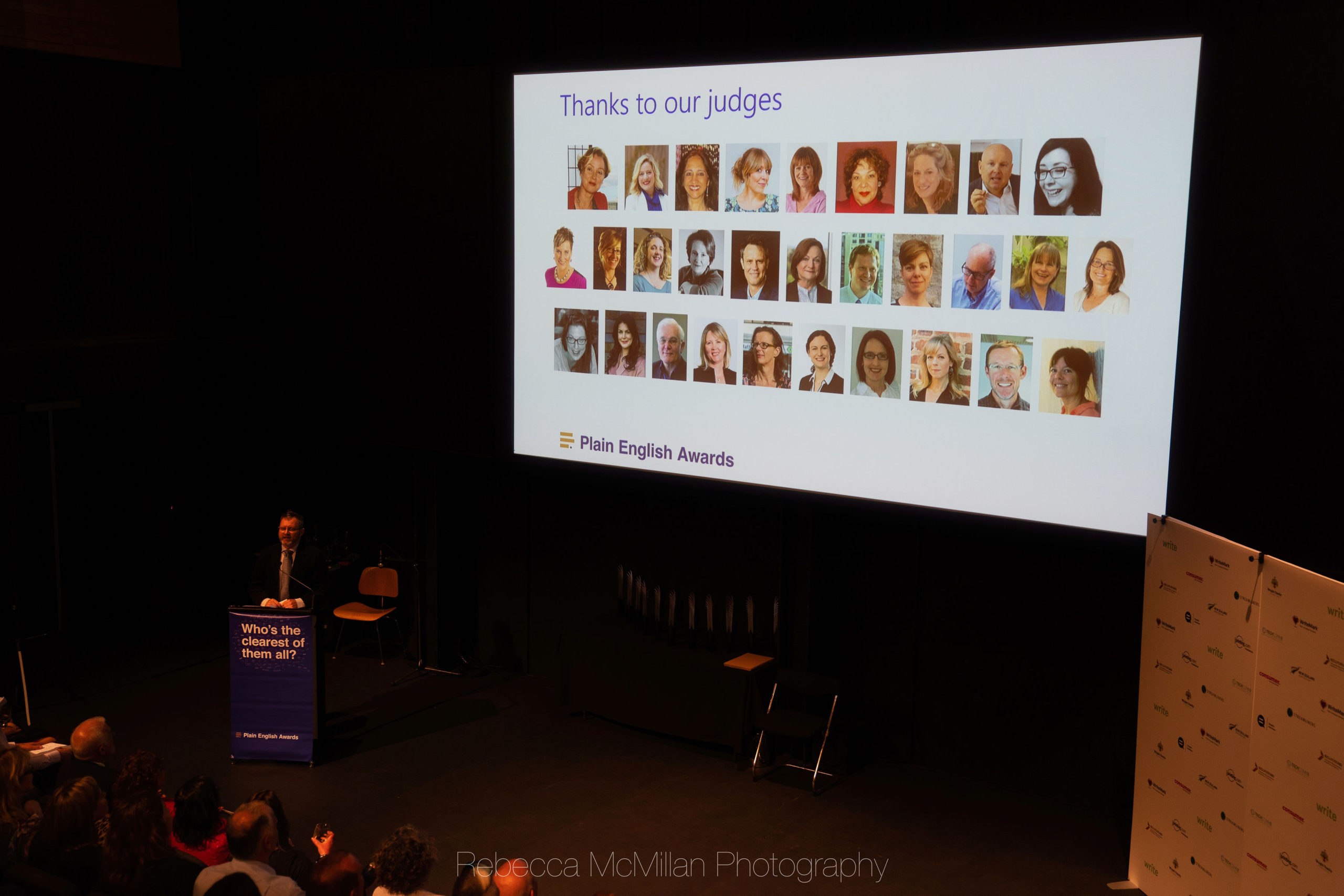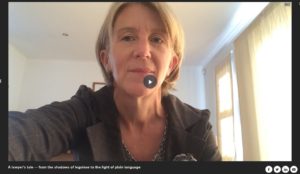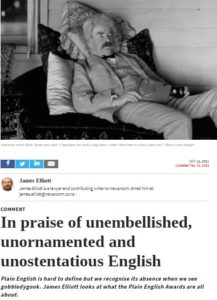Media release: 14 October 2021
Winners in the 2021 annual Plain English Awards were announced at an online ceremony earlier today. More than a hundred people attended the virtual ceremony, including many Awards supporters from outside New Zealand.
Two Champion winners
The award for the Plain English Champion — Best Organisation went to Citizens Advice Bureau New Zealand (CAB). Lead judge for the category Matt Huntington said he was particularly impressed by CAB’s understanding of how communicating clearly is key to their effectiveness.
‘And then they take it one extra step to acknowledge the importance of communicating with empathy and respect on top of that!’ Matt says. ‘The fact that they can do this successfully while relying on such a large and diverse group of volunteers is a testament to their grounding in plain language communications.’
Entries for the Awards opened up to Australia for the first time this year. And one of the Australian entries was awarded the Plain English Champion — Best Individual or Team. Lauren Kelindeman, from law firm Legalite in Melbourne, was praised by judges for her exemplary work. Legalite was also a finalist in the Plain English Champion — Best Organisation category.
‘Lauren’s commitment to plain English shines bright in the amount of work she’s done and the quality of the advice she’s created,’ says judge Steph Prince.
In praise of clear documents and websites
The award for the Best Plain English Document in the private sector went to Ryman Healthcare for its myRyman Life eLearning tool. Health Navigator NZ took out the public sector award with its leaflet on treating type 2 diabetes, Empagliflozin.
The Best Plain English Website award for the public sector went to the Ministry of Social Development for the website www.youthservice.govt.nz. No entries made it to winner status in the private sector award for this category in 2021.
Rethinking a document or website to improve it
The Best Plain English Turnaround award went to Waka Kotahi New Zealand Transport Agency for its turnaround of The New Zealand code for cycling.
Legal, Annual Report, and Technical Communicator categories
Southern Cross Travel Insurance took out the Best Legal Document award for its Domestic Travel Insurance Policy Document.
National Trauma Network won Best Plain English Annual Report for its New Zealand Trauma Registry Annual Report 2019/20.
The Best Plain English Technical Communicator was the team at thinkstep-anz.
Spotlight on the humble sentence
Auckland City Council won the award for Best Plain English Sentence Transformation.
People’s Choice — the best ‘but no worst’
Several top-notch entries were submitted by members of the public for the People’s Choice — Best Plain English Communication category. Kiwibank won this award for its letter We’re improving our home loan documents.
One of the judges of this entry said, ‘Taking complex subject matter such as home loans and making it accessible is not easy. Kiwibank have done an excellent job in communicating this, and on a single A4 sheet! Bravo!’
And in what is thought to be a first for the Plain English Awards, no entries were received for the notorious People’s Choice — Worst Brainstrain award. Lead judge for this category Simon Hertnon says he’d like to think that this is a good sign: ‘A sign that people are putting more thought into their communications. That the plain language message is getting through.’
Telling stories to inspire others
The theme of this year’s Awards was ‘Story!’ Awards founder and CE of plain language consultancy Write Limited Lynda Harris says:
‘The goal of sharing stories is to help people understand the “why” behind different plain language projects. That is, why a plain language approach was vitally important for that project, and how it helped its success.
‘By telling people’s stories, we want to shine a light on the impact of people’s efforts. And to give the public a glimpse behind the scenes of plain language as it plays out in the lives of individuals and organisations. Ultimately, we’d like people to be inspired to take similar approaches.’
Thanks to Awards sponsors
Sponsors play a key part in keeping the Plain English Awards going. Organisers would like to thank the following organisations for their support: WriteMark Limited, Write Limited, the Wright Family Foundation, Graphic Solutions, NZ Super Fund, Newsroom, Streamliners, TechCommNZ, Skillset, printing.com, MoneyHub, Consumer, Shelly Davies, Community Comms Collective, Editor Software (UK), Informed Investor magazine, Kendons, and Modica Group.
Find out more
See the full list of winners and finalists
Nicola Welby October 20th, 2021
Posted In: 2021 Awards ceremony, Communications, Media release
Tags: 2021 Plain English Awards, Best communication, Best Plain English Communication, Brainstrain, champions, clear communication, People's Choice, plain English, Plain English Awards, plain language, recognition, writing for the public

Thanking our judges at an Awards ceremony | Photo by Rebecca McMillan Photography
We asked our judges for some insider advice and tips to pass on to people considering entering the Awards.
And as usual, they were more than happy to help out!
We asked our judges:
- what aspects of an entry makes them think ‘this one is a winner’
- what their top piece of advice was for someone entering the Awards
- what common missteps they see that quickly let them know an entry won’t be a finalist
- what they thought were the most notable features of winning entries from past Awards.
This type of entry is a winner
One judge liked entries that surprised them and surpassed their expectations.
Others said, ‘First impressions are crucial. For me, if the structure is helpful and logical, the language simple and clear, and the tone friendly and engaging, then the authors will definitely be in the running to be winners’.
‘The language will be the equivalent of plain speaking — ordinary, everyday language throughout the text. The document will do the job the writer describes to us.’
‘I think for me that’s when I can feel that the writer has put the effort in to realise that they are writing for a reader. It might not be perfect, but you can tell that they are thinking about the receiver of the message.’
‘It’s how the authors weigh and balance the various aspects and elements of the communication — the audience and its needs, the situation and its urgency or characteristics, the political charge of the situation and people’s reaction, and how all of that has an impact on the message, tone, word choice, sentence construction, images — and when they tell me that they have talked to the intended audience, instead of just assuming they got it right. When all of these things are cohesive, I know I have a winner.’
‘Simplicity and clear evidence of designing the information for the audience.’
Our judges’ top pieces of advice
Our judges want entrants to put themselves in their readers’ shoes. They want you to forget about yourself and your message. Just ‘focus on your readers’, one said, and we agree. Your audience is, after all, what really matters.
Always put yourself in your readers’ shoes. You wouldn’t want to wade through dense, long-winded, jargon-filled reports. Neither do your readers!
Another common theme from our judges was:
Keep it simple!
Here are some other top tips from our judges.
- Don’t get in your own way.
- Leave your ego at the door.
- Brevity is the currency of good comms.
- Think outside of the box, talk to talk to your customers, ask them what they want and need, get to know them. And … surprise yourself!
- Avoid bureaucratic language, particularly impersonal, passive, or pompous sentences.
- Keep it short, sweet, and simple! (No one wants to read lots on a screen.)
- Make a human connection. Show that your piece reaches its audience and has results. Show that every decision was carefully made based on evidence, not assumptions. And even better, try to show documented results — fewer phone calls, more returned surveys, bills paid sooner.
Common missteps judges see in entries
Here’s more on what to avoid, with some examples from the judges of missteps in entries that didn’t make the grade.
Lack of focus on the intended reader
- Too much focus on their own story
- Using their company name over and over again, instead of using ‘us’ and ‘you’
- Text that suggested that the writer wanted the message or the organisation to seem important
Unclear purpose
- A lack of attention to the purpose of the entry. ‘With no ‘care’, probably no need to share…’
- Failing to talk about the goal of your piece in terms of what you want your audience to be able to do with the information
Language-related problems
- Using unfamiliar words in place of everyday words that most people will easily understand
- Too many words, repetition
- Vague language, jargon, or management clichés
Lack of testing or evaluation
- Not being able to show that you tested your piece with your intended audience, no matter how limited the testing
- Not being able to show how you used feedback to improve the document or website
Stronger editing or design needed
- Clumsiness in the writing
- Too much text and not enough white space
- Not being able to explain why you made a choice about design or word choice based on your intended audience.
- Overwriting — including information that just dilutes the purpose of the document — and a lack of tailoring
The most notable feature of past winning entries was putting the reader first
Judges all agreed that putting the reader first was the way to a winning entry. ‘Clarity and consideration of the audience’, said one judge.
Winning documents were thoughtfully and helpfully laid out, using clear and simple language, and in an engaging tone that inspired trust.
‘They all really moved into the heads of their readers’, one judge said. ‘What questions do they have? How can we answer those questions as clearly as possible? How can design help us? What tone of voice is needed?’
‘We have been unanimous in selecting entries that showed unusual skill, such as explaining bowel cancer with sensitivity and clarity. Others have explained complex topics in everyday language.’
‘I’ve only judged the Best Plain English Sentence Transformation before … ‘short and active’ were the two main ingredients!’
‘One of the most memorable entries I judged several years ago was a newsletter updating residents about a major road closure that was going to last several months. The details were highly technical; the inconvenience was very high for anyone who used the road. But the newsletter used similes and metaphors to explain the technical aspects; for example, ‘We need to remove the equivalent of two soccer arenas of rock’. The writer used humour and truth and, as a result, built the trust of those who read it. It could have been a boring weekly update, but instead was an engaging read in terms that even a non-engineer — who didn’t live anywhere near there — could understand. That was understanding the audience and the situation and creating something more.’
‘A conversational tone. And good design (white space, colour, graphics, and so on).’
Some extra wisdom from our judges
Our judges wanted entrants to enjoy the process. ‘The standard has been rising over time’, one said. ‘Even to be chosen as a finalist is impressive and should go in your CV. The ability to write in plain English is in demand around the world.’
Another judge added, ‘It’s a great way to get valuable personal feedback on your writing! And you support plain language for everyone, no matter what someone’s abilities or background are. A great cause.’
‘No matter the outcome for your entry this year, read the comments of the judges with interest. For the most part, they will give you insights on how to approach about your next communication in a richer way.’
‘Plain English is not an add-on to good business writing — it is good business writing.’
Read Trophy Tips: Top tips from past winners
Find out more about this year’s judges
Watch videos by some of our judges in our gallery
Nicola Welby July 5th, 2021
Posted In: 2021 Plain English Awards, Communications, Judges, Plain English Awards, Trophy Tips
Tags: clear communication, clear thinking, clear writing, Finalists, improved writing, insights, plain English, Trophy Tips Seminar, winners

Our judges explain why they love to be involved in the Plain English Awards | Photo by Anastasia Zhenina on Unsplash
When we surveyed our judges for their top tips for a winning Awards entry, we got some lovely feedback about why they love to judge the Awards. We thought you might like to read it too. Perhaps some of the thoughts here will inspire you to celebrate plain language in your own organisations. And you might feel more inclined to demand clear communication from the organisations you encounter in your daily life.
Our judges love celebrating the use of plain English
Our judges felt that that the Plain English Awards are a fantastic way of encouraging and celebrating plain language in organisations.
As an ardent supporter of clear writing, I’m delighted to support them.
I think we should encourage people to excel in this area.
It’s fun, interesting, and it helps me with my mission: plain language as a human right, world wide!
I’ve been leading workshops on writing in five countries for more than 30 years. Judging the competition has always seemed a natural complement.
I love what Write does and stand for and I think any opportunity to promote plain language is a good opportunity.
It’s incredibly important to recognise good writing in and by organisations because they serve as an example to other organisations. In addition, New Zealand’s Plain English Awards have been a model and inspiration for other awards. I learn so much each time I judge.
To help out the plain English community. To keep in touch with the standard of writing across Aotearoa. And I suppose it’s good to have my name connected with the Awards. It’s certainly ‘on brand’!
From the shadows of legalese to the light of plain language
One of our judges, Jacqueline Stephenson (now a legal and business proofreader and plain language editor), shares some reflections on her years as a practising lawyer in the UK and New Zealand. Why did she write the way she did? And what does plain language in legal writing mean to her now?

Watch Jacqueline Stephenson’s video in our gallery
Awards founder Lynda Harris asks us all to demand clear communication
When Lynda Harris spoke at the Awards ceremony in 2018, she encouraged everyone present to demand clear communication, whether as a writer or a consumer.
So, believing what you do about the power of plain language, my question to you as both writer and consumer is ‘what action can you take that is bigger and bolder than before?’ How can you make your sense of care count?
Read Lynda’s inspiring words from that speech in our 2-part blog.
Care — the shortcut to plain language (part 1 of Lynda’s speech)
Care into action — rewrite or reject! (part 2 of Lynda’s speech)
Anne-Marie Chisnall July 5th, 2021
Posted In: 2021 Plain English Awards, Communications, Judges, Plain English Awards
Tags: clear communication, democracy, improved writing, insights, judges, leadership, plain English, Trophy Tips Seminar

Will you join our prestigious list of winners? | Photo of 2018 Award winners by Rebecca McMillan Photography
We asked past Award winners what appealed to them about entering the Plain English Awards, what advice or feedback they got from the judges, and what tips they’d give to anyone entering this year.
We hope you find these tips useful!
We asked our winners:
- why entering the Awards appealed to them
- what features of their entry the judges appreciated the most
- what they would do differently if they entered the 2021 Awards
- what their top piece of advice was for this year’s entrants.
Why entering the Awards appealed to our past winners
- ‘We knew what we were doing was important and wanted to share that with other people who care about plain English.’ (Plain English Champion winner)
- ‘I met someone years before who’d entered and won an award, so for me it was a development goal to work towards. I wanted to become good enough, consistent enough and confident enough in what I do to deserve one of these awards. I also wanted to connect with people in similar roles to me and support and celebrate their achievements too.’ (Plain English Champion, Best Plain English Sentence Transformation winner)
- ‘I believe plain English is so important in society and I wanted to be a part of making change. I loved the challenge of making a technical document plain!’ (Best Plain English Document — private sector winner)
- ‘I think good technical communication deserves to be celebrated, and I love a challenge! Plus I thought that if I won, the award would look good on my desk and in my CV.’ (Best Plain English Technical Communicator winner)
The judges appreciated easy-to-read letters with a personal tone and clear design
The judges appreciated documents that were well structured and elegantly designed. They appreciated that a team effort often plays a part in improving communication. The judges also felt enthusiasm for plain English coming across in personal tone and were impressed by the entrants’ dedication to using both plain English and smart design to make their organisation’s communications clearer.
Judges also liked seeing great layout, and technical language explained clearly.
One winner said that the most powerful thing they did was include quotes from people on a benefit. ‘We had people thanking us for sending them easy to read and kind letters.’
Our winners said they could always find room for improvement
One said, ‘I’d take everything I’ve learnt since I last entered, and talk about that — the challenges, the new thinking, the lessons learned, the new responsibilities, and the successes.’
‘I would include more about the difference it made to people’, said another.
One entrant entered an instruction manual that was designed for the web, including drop-boxes that opened on click. As this was not a public-facing website, the entrant had to provide the content in Word, which wasn’t ideal. They said that in future they’d choose examples that they could provide in a more accessible format.
Our winners shared their top pieces of advice for someone entering the Awards
- ‘You have to really care about your entry and what you worked on.’
- ‘Structure your supporting evidence well, to make the value you’ve added to plain communication really clear and convincing for the judges.’
- ‘Design is as important as the plain English words used. Your layout is an integral part of plain English, as are any design features used.’
- ‘It sounds obvious, but make sure you read “What you need to know” for the category, and make sure you provide judges with everything they are looking for.’
Some more words of wisdom from our winners
Our winners agreed that ‘plain English is underrated, yet crucially important’. They also felt it was fantastic to be part of the plain English movement.
A plain English document can win your business customers, save readers valuable time, improve your organisation’s credibility, and even save lives.
The Awards recognise that it’s not always easy to keep things simple — our project was really daunting — but it’s so important.
The Awards have a really fantastic celebratory vibe. Even if you don’t win, it’s a great achievement to be a finalist and support other finalists, and to be part of an important movement in New Zealand.
Thanks to all our past winners for their valuable advice! We hope all our entrants get as much out of entering the Awards process as valuable as our past winners have!
Read Trophy Tips: In the words of our judges
Read about past award winners
How to enter the 2021 Plain English Awards
Nicola Welby July 5th, 2021
Posted In: 2021 Plain English Awards, Plain English Awards, Trophy Tips
Tags: clear communication, clear thinking, clear writing, Finalists, improved writing, insights, judges, plain English, Trophy Tips Seminar, winners

Calling all our Australian friends: It’s time to celebrate your successes in clear communication | Photo by Karl Anderson on Unsplash
Plain language is important to us here in New Zealand. It’s also a big thing in Australia. At the moment, Australia doesn’t have any awards celebrating clear communication.
Let’s not beat around the bush! After recognising the gap and fielding several enquiries, we’re opening up entries to Australia.
Haere mai, Australian plain language enthusiasts!
We’re excited to now be welcoming entries from any individual or organisation in Australia, as well as New Zealand. You’d just need to meet the same conditions as entrants do here: See our terms and conditions
You’ll also need to be an organisation that’s registered in Australia, or have a registered Australian address.
The standard entry fee for people in Australia will be AUD$125, and AUD$65 for registered charities.
Australian-based entries are welcome for any Awards categories
From Champion Organisation through to Best Plain English Legal Document, people and businesses in Australia are welcome to enter any of our categories. You can also nominate the good and the bad in our two People’s Choice categories: the Best Plain English Communication and the Worst Brainstrain Communication.
So what are you waiting for? It’s time to get entering!
Entries are open until 31 July
Read about how to enter
Melissa Wardell June 17th, 2021
Posted In: 2021 Plain English Awards, Australian clear communication awards, Communications, People's Choice awards, Plain English Awards
Tags: Best Legal Document, Best Organisation, Best Plain English Communication, Brainstrain, Champion, clear communication, People's Choice Awards, plain English, Plain English Awards

Shine bright like a diamond — enter the champion category of the Awards in 2021 | Image by Dimitris Christou from Pixabay
You’ve read about the Champion category for Best Organisation. But, rather than an organisation, you have an individual (maybe it’s you?) or a team that deserves recognition for its plain language achievements.
The Plain English Champion — Best Individual or Team award honours the people who work hard to make plain language a reality in their organisation. The award is open to individuals or teams who have significantly contributed to a plain language initiative in any New Zealand organisation.
Now is your time to shine, so don’t be shy!
We know that so much work goes into projects that support clear communication. Over the last year or so we’ve seen some amazing examples of this. These communications played a big part in us reinvigorating the Plain English Awards for 2021.
To the people behind New Zealand’s public health communications about COVID-19, we’re looking at you! And we know many other teams and individuals have done similarly inspiring work, whether in the public eye or known only to their colleagues or customers.
Here are some examples to get you thinking. You or your team might have:
- influenced senior leaders to support a plain language initiative
- led a plain language project, large or small
- run workshops or regular team meetings on using plain language
- formally or informally supported other writers to help them produce clear, reader-friendly communication more consistently
- written newsletter articles or intranet resources about plain language for your team or organisation
- rewritten template letters into plain language, saving time for your team
- created clear, easy-to-use policies or guidelines for your organisation.
Meet the winning entry in 2018
Here’s what the judges said about the impressive entry from the MSD Better Letters Project team in 2018.
This initiative is representative of the nitty gritty, down and dirty, battlefield for plain language. They are making appreciable change at scale. And making a difference in the lives of people in vulnerable circumstances. Very well done. The Better Letters Project at MSD is a worthy plain English champion!
Read more about the Better Letters entry
Meet finalist Andy Baldwin of WineWorks
The judges loved Andy’s passion as a champion of plain language in his organisation. Read how he did it.
I enlisted some help and formed a team. I began to study plain English and promote it within the organisation, presenting my ideas to managers and directors. Like any movement it took time to get momentum, but once we achieved ‘critical mass’ people began asking me to teach them how to write better. I think this is the biggest compliment of all. Now we have people throughout WineWorks writing and using great plain English SOPs in their daily work. This is improving our processes and helps to upskill our teams.
Read more about finalist WineWorks
Entries are open until 31 July
Read about how to enter
Read the requirements for the Plain English Champion — Best Individual and Team category
Discover whether you’re a contender for the Plain English Champion — Best Organisation category
Nicola Welby June 14th, 2021
Posted In: 2021 Plain English Awards, Awards brand, Best Individual or Team, Communications, Plain English Awards, Plain English Champion
Tags: 2021 Plain English Awards, Champion, champions, clear communication, plain English, Plain English Awards, plain language

We’re excited to announce that entries are open! | Photo by James Lee on Unsplash
The Awards are officially open for entries in all categories. After a break in 2020, the Awards are back for 2021 — and they’re better than ever! We all saw the amazing benefits of clear and plain communications from the Government and health agencies. This heightened awareness of clear communication has set the scene beautifully for the return of the Plain English Awards.
Here’s what you need to know about the Awards in 2021. We’ve got a new unifying theme for the Awards, a combination of new and familiar judges, and all your favourite categories.
Tell the story of your plain language project
This year we’ve introduced a Story theme — and we’re offering you the chance to share your plain language stories through our video gallery. We’re particularly looking for people in workplaces to share stories about the benefits of their plain language projects. No project is too big or too small!
These stories will inspire others to embrace the benefits of plain language for organisations and their customers. We hope the gallery will become a go-to resource for people to get plain language inspiration.
Our judges and sponsors are joining in the fun as well. You can share a video without needing to enter the Awards. But we hope you’ll feel inspired to enter once you read about the available categories.
Check out the first videos in the gallery
Meet our judging panel
From Dunedin to Denver, Gisborne to Edinburgh, this year’s judging panel is made up of plain language experts from around New Zealand and the world. You’ve met some of them before and others are joining us for the first time in 2021. Together they make up an experienced and insightful team of plain language pros!
Find out more about this year’s judges
Choose your Awards category and get your entry ready
The Awards have a range of categories to suit almost every type of document (and websites).
If you’re starting off or pressed for time, you might consider entering the short and sweet Best Plain English Sentence Transformation. If you’ve transformed a whole document, you might be ready for the Best Plain English Turnaround. You can enter a Best Plain English Document or Website — with a choice of public or private sector.
For specialist business documents, you’ll find a Best Plain English Legal Document category and Best Plain English Annual Report. We’re seeing some of the finest examples of these documents coming through, with the quality of entries rising every year.
Specialist technical communicators have a category just for them. And those working on a team project or an organisation-wide project can enter the Champion categories.
Discover whether you’re a contender for the Champion category
Get some inspiration for the Sentence Transformation category
Review all the categories and find out how to enter
Nominate a best or worst communication
The Awards also include two categories that any member of the public can nominate communications for, to be judged by our People’s Choice judging panel. These are the People’s Choice Best Plain English Communication and the Worst Brainstrain Communication categories. These categories are always lots of fun — we love giving a voice to all of New Zealand.
Read about the People’s Choice in 2019
Get involved in the 2021 People’s Choice awards
Anne-Marie Chisnall May 31st, 2021
Posted In: 2021 Plain English Awards, People's Choice awards, Plain English Awards
Tags: Best Plain English Communication, clear communication, clear writing, judges, People's Choice, People's Choice Awards, plain English, Plain English Awards, Worst Brainstrain

The very hungry caterpillar, by Eric Carle | Photo by eric-carl.com
I don’t know about you, but I first learnt how to write professionally in an academic setting — the more information you can feed into someone’s brain, the better the result. While we might love to gorge ourselves on a treasure trove of knowledge, too much information can wear us out. Our brains have to work even harder to digest what’s in front of us, and sometimes all the ‘smart’ words don’t even make sense.
The Best Plain Language Sentence Transformation is one of my favourite categories in the Plain Language Awards. You get to see great before-and-after examples of unplain, jargon-heavy text transformed into beautifully clear sentences. But an added bonus for entrants is being validated in having permission to write using plain language.
Trim the fat, keep the flavour
The easiest way to think about the Best Plain Language Sentence Transformation category is through the lens of a classic childhood read. The Very Hungry Caterpillar by Eric Carle (rest in peace) is a children’s picture-book that tells the story of a caterpillar who becomes a butterfly.
The caterpillar hatches from its egg, and begins to eat more and more each day. At one point, it has a ridiculous feast and becomes ill from overeating. Having learnt its lesson, the following week it takes on a lean diet with a large green leaf, before spinning a cocoon to chill out and emerge as a beautiful butterfly.
The caterpillar represents all the words we want to write. We’ve hatched an idea and we want to spread our message. But we’ve got so many thoughts and ideas to add that we sometimes lose our direction. Our sentences become bloated and it’s exhausting to even look at our writing. What we’re left with is the Sunday evening special — what any food critic would describe as a hot mess.
And on another level, the caterpillar represents your audience — who you’re writing for. And the food it eats is all the words that you’re throwing at it. You wouldn’t take your vegetarian mates out to an all-you-can-eat Brazilian barbecue now, would you?
Five easy tricks for a word diet — thesauruses hate them!
So what’s the recipe for a great sentence? Here are five easy tricks to cook up a beautiful serving of alphabet soup.
- Keep sentences to an average of 15–20 words for print, or 12–15 words for online text.
- Use the active voice, rather than the passive voice.
- Ask a mate to read what you’ve written and see if it makes sense to them — bonus points if they’re your target audience.
- Be consistent in how you describe technical, complex terms.
- Write like a human and not like a robot.
Beauty is in the eye of the beholder. And for me, a crisp and clear sentence is the apple of my eye — a work of art that I appreciate more than anything else. So bring out the red pen, bin the jargon, and show the world all the beautiful butterflies you’ve created.
Enter the Best Plain Language Sentence Transformation category
Jonathan Tan May 31st, 2021
Posted In: 2021 Plain English Awards, Best Plain English Sentence, Plain English Awards
Tags: 2021 Plain English Awards, Best Plain English Sentence, Best Sentence, plain English, Plain English Awards, transformation

James Elliott asks and answers a common question | Photo by Jon Tyson on Unsplash
As our Awards MC James Elliott recently pointed out in an article on Newsroom, sometimes it’s easier to work out what something is by first working out what it is not.
In the case of plain language, it’s not the passages of writing that leave you scratching your head. Rather, it’s those passages that pass you by unnoticed that are at the heart of plain language.
‘The best example of plain English is a grouping of words that almost passes us by unnoticed because it doesn’t require a second thought or consideration. We understood what it meant the first time around.’

Read James Elliott’s article in praise of plain English
Melissa Wardell May 20th, 2021
Posted In: 2021 Plain English Awards, Plain English Awards
Tags: clear communication, MC James Elliott, Newsroom, plain English, power of plain English, sponsors
Media release: 7 May 2021
After holding off entries last year, the full Plain English Awards are back in 2021. The Awards will look a little different this year, with a virtual ceremony and some new ways for entrants to share their inspiring work in clear communication.
Fresh Awards with a new theme
This year’s theme for the Awards is Story. We’re inviting the public to share the stories behind their plain language projects in short videos. We’ll showcase these videos in a gallery to inspire and enlighten the wider public. The video gallery is open now.
‘A major goal for the Awards has always been to bring plain language into common use,’ says chair of the WriteMark Plain English Awards Trust, Gregory Fortuin. ‘We know that stories raise awareness and inspire action. The more visible the stories of our entrants, the more sparks of possibility and innovation will be lit.’
All the familiar categories are back
This year’s Awards will feature all categories, including the two People’s Choice categories for Best Communication and the infamous Brainstrain.
‘As we’ve seen in the events of 2020 and beyond, clear communication makes a real difference in people’s lives,’ Gregory says. ‘Here’s a chance to celebrate all the great work that people having been doing over the past couple of years.’
Important dates for the 2021 Awards
- 1 June: Entries open
- 31 July: Entries close
- 30 September: Finalists announced
- 14 October: Winners announced
Big thanks to our media partner, Newsroom
The goodwill and support of our sponsorship partners keeps the Plain English Awards ticking. We’re immensely grateful to New Zealand-based news and current affairs site, Newsroom.co.nz for believing in our cause and being our media partner.
ENDS
Get more information
www.plainlanguageawards.org.nz
Jonathan Tan, project manager, 2021 Plain English Awards | enquiries@plainlanguageawards.org.nz
OR
Gregory Fortuin, Chair, WriteMark Plain English Awards Trust | 021 465 254
Nicola Welby May 7th, 2021
Posted In: 2021 Plain English Awards, Communications, Media release, Plain English Awards, Story theme
Tags: 2021 Plain English Awards, Best communication, Best Plain English Communication, Brainstrain, clear communication, People's Choice, plain English, Plain English Awards, plain language, recognition, writing for the public











